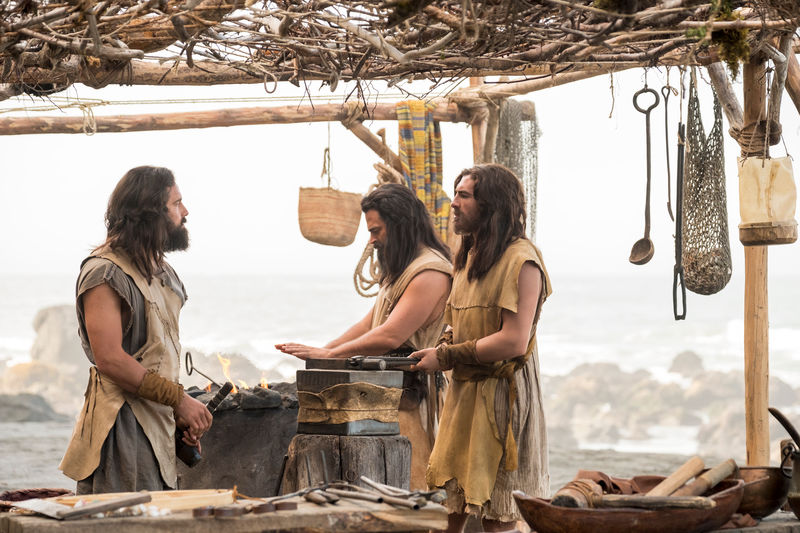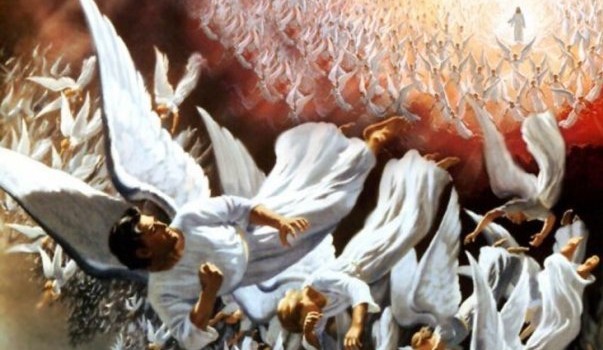
In his General Conference talk in October 2020, “Tested, Proved, and Polished,” President Henry B. Eyring made an interesting statement:
My hope is to give encouragement when life seems especially difficult and uncertain. For some of you, that time is now. If not, such a time will come. That is not a gloomy view. It is realistic—yet optimistic—because of God’s purpose in the creation of this world. That purpose was to give His children the opportunity to prove themselves able and willing to choose the right when it is hard. In so doing, their natures would be changed and they could become more like Him. He knew that would require unshakable faith in Him.
In this simple statement, President Eyring makes the most subtle correlation: when we begin to understand the purpose of the world’s creation we can develop resilient and unshakable faith for times especially when life seems difficult and uncertain. Later, he asserts that this knowledge will ultimately change our natures.
What a fascinating statement! How can this be? What does this mean? Is there scriptural evidence for this? And if so, where is it?
As my mind raced through these questions, scriptural phrases began to come into my thoughts one after the other as my search for references followed each other in a steady stream of ideas. As soon as I could grasp one concept, another scriptural phrase flooded into my thoughts, adding to my understanding. The more I read, the more I remembered. The more I wrote, the more I understood.
I share this with you because I believe that this understanding—the knowledge of why God created the earth—is a fundamental and vital principle. If it were learned, believed, and lived, if its meaning could sink deep down into the hearts of all who received it, I am convinced that not a single soul would abandon their faith … come what may. It is the answer to the most basic questions asked by humanity: Where did I come from? Why am I here? Where am I going after this?
The search begins with a single question:
How does understanding the purpose of the earth’s creation help us live with unshakable faith and ultimately change our natures?
There is evidence in the Book of Mormon—at the very beginning, in fact—of the correlation between knowledge, belief, and behavior related to this very question. Let’s look closely and deeply at the responses to adversity from Laman and Lemuel, the oldest sons of Lehi, and the opposite responses by Nephi and Sam, Lehi’s younger sons.
Let’s begin, in 1 Nephi 2:11-13, in the Book of Mormon Lehi has informed his four sons that they are leaving Jerusalem for good. In a prophetic vision he sees Jerusalem besieged, the temple sacked. The response of his children is recorded:
Now this he [Lehi] spake because of the stiffneckedness of Laman and Lemuel; for behold they did murmur in many things against their father, because he was a visionary man, and had led them out of the land of Jerusalem, to leave the land of their inheritance, and their gold, and their silver, and their precious things, to perish in the wilderness. And this they said he had done because of the foolish imaginations of his heart.
Stop. We have to dig into this. What did Laman and Lemuel want? Why were they complaining and disturbed? What does Nephi indicate is the source of their rebellion? The answer is simple and clear. They wanted to keep all the things that made life comfortable, not just money—“gold … silver, … and “precious things”—but the “inheritance”—all the trappings of the land, power, and influence linked to the elite social position held by their father. The power of inherited status, not to mention the cultural niceties of a developed society and prospering city that Jerusalem must have enjoyed at this zenith prior to the Babylonian invasion, would certainly have been a seductive temptation to cling to. In 600 B.C., Jerusalem lay on a vital trade route. This geopolitical fact implies what wealth, finery, and delicacies, through trade, must have richly adorned that city and would have been particularly within reach in the lives of Lehi’s children. Why did it have such a hyper-fixating pull in Laman and Lemuel’s lives? Let’s read on:
And thus Laman and Lemuel, being the eldest, did murmur against their father. And they did murmur because they knew not the dealings of that God who had created them (emphasis added).
 Because Laman and Lemuel had no spiritual understanding regarding the purpose of the earth—”the dealings of that God who created them,” and the earth’s role in their purpose or “creation,” they turned their full attention to its pleasures. What a powerful warning! This gives us a clear measuring stick for the foundations of our own value systems. Additional insight follows:
Because Laman and Lemuel had no spiritual understanding regarding the purpose of the earth—”the dealings of that God who created them,” and the earth’s role in their purpose or “creation,” they turned their full attention to its pleasures. What a powerful warning! This gives us a clear measuring stick for the foundations of our own value systems. Additional insight follows:
Neither did they believe that Jerusalem, that great city, could be destroyed according to the words of the prophets. And they were like unto the Jews who were at Jerusalem, who sought to take away the life of my father (emphasis added).
It gets worse. Their focus on pleasure became so single-minded that they turned their hearts against any influence to the contrary through unbelief and even began to plot against the life of their father. They were willing to murder to preserve their pleasure systems. Isn’t that interesting?
It’s not a statement against money, nor influence, culture, nor comfort. Lehi, the prophet, their father, had all the temporal trappings Laman and Lemuel coveted: money, status, influence. In fact, unlike Laman and Lemuel, Lehi probably even earned it himself! But Lehi didn’t make those comforts the end of his existence. He knew and believed better. He held them in their proper order and perspective, acting accordingly. His belief systems and behavior were founded in a deeper knowledge—in the divine and eternal purposes of the God “who created [him].”
Related: Are You a Nephi or a Laman? Understanding the Descent into Apostasy
Let’s look at Nephi and Sam’s reaction to all this in 1 Nephi 2:16–17. Nephi is in the exact same predicament as his older brothers but he responds completely differently. Pay particular attention to what Nephi says is the source of his change of heart:
And it came to pass that I, Nephi, … having great desires to know of the mysteries of God, wherefore, I did cry unto the Lord; and behold he did visit me, and did soften my heart that I did believe all the words which had been spoken by my father; wherefore, I did not rebel against him like unto my brothers.
And I spake unto Sam, making known unto him the things which the Lord had manifested unto me by his Holy Spirit. And it came to pass that he believed in my words (emphasis added).
What are “the mysteries of God”? This is a vast question. Its multitude of answers is the reason that of the 2.52 billion believers alive today, there are at least 45,000 denominations in Christianity alone. These mysteries harken back to the three simple questions posed by all rational creatures: Where did I come from? Why am I here? Where am I going after this?
What is it about knowing the purposes of God and of His creations that gives Nephi resilience? That inspires his faithfulness in hardship?
In his youth and ignorance, Nephi didn’t know yet what to prioritize. He wanted answers, so he followed the simple pattern we all follow for receiving truth: “cry unto the Lord … hav[e] great desires … to know” and then, listen for the manifestations of “his Holy Spirit.” Nephi received knowledge about these mysteries and when he shared his understanding with Sam, Sam believed, too. They both believed. What loaded words. Belief implies behavior. Belief in the knowledge of God’s purpose for creating them gave them the impetus to act in faith, even when the testimony came second hand from one believing brother to another.
Let’s revisit the primary question and break it apart further:
How does understanding the purpose of the earth’s creation help us live with unshakable faith and ultimately change our natures?
Let’s look into these two parts specifically:
1.) Why did God create the earth? What is its purpose?
2.) How does this relate to my development of unshakable faith as I go through difficult and uncertain times? How does this ultimately change my nature?
To find the answers, we will cover scriptures in the Pearl of Great Price, the Book of Mormon, and the Doctrine and Covenants. For the first couple of scriptures, we will be specifically asking: What is the purpose of the earth’s creation according to this scripture? Then we’ll shift into how this knowledge refines us.
Let’s begin by linking to a scripture reference referred to in the footnotes of 1 Nephi 2:12. What did Laman and Lemuel not know or not believe? The footnote directs us to Moses 4:6 in the Pearl of Great Price.
And Satan put it into the heart of the serpent, (for he had drawn away many after him) and he sought also to beguile Eve, for he knew not the mind of God, wherefore he sought to destroy the world.
Next, let’s look in The Pearl of Great Price at Abraham 3:25–26. In the preceding verses, God has shown Abraham universes. Abraham says, “I saw those things which his hands had made, which were many; and they multiplied before mine eyes, and I could not see the end thereof” ( Abraham 3:12). He tells Abraham that the order and greatness of the planets have a parallel in the order and greatness of man, the one symbolizing the other. In verse 21 God tells Abraham, “I dwell in the midst of them all [both planets and intelligences]; I now, therefore, have come down unto thee to declare unto thee the works which my hands have made …”. When revealing the innumerable planets of His creation, God tells Abraham to share this knowledge in his travels to Egypt. Why? Because of the reason for their creation which He reveals in verses 25-26:
And we will prove them herewith [with the conditions of earth life], to see if they will do all things whatsoever the Lord their God shall command them;
And they who keep their first estate [premortal life] shall be added upon; and they who keep not their first estate [rebel in premortal life] shall not have glory in the same kingdom with those who keep their first estate; and they who keep their second estate [fulfill the purpose of earth life] shall have glory added upon their heads for ever and ever.
For clarification, the “first estate” is pre-earth life. The “second estate” is earth life or mortality. President Eyring, in his talk “Tested, Proved, and Polished,” teaches that everyone born onto the earth passed the “first estate”: “You and I accepted that invitation to be tested and to prove that we would choose to keep the commandments of God when we would no longer be in the presence of our Heavenly Father.
Even with such a loving invitation from our Heavenly Father, Lucifer persuaded a third of the spirit children to follow him and reject the Father’s plan for our growth and eternal happiness. For Satan’s rebellion, he was cast out with his followers.”
 This means that Satan and his followers could not progress to the second estate, or earth life. This means no Body, no Marriage, no Posterity, no Exaltation, no return to God’s presence to live—forever. Because of this, President Eyring says, “Now he tries to cause as many as he can to turn away from God during this mortal life.”
This means that Satan and his followers could not progress to the second estate, or earth life. This means no Body, no Marriage, no Posterity, no Exaltation, no return to God’s presence to live—forever. Because of this, President Eyring says, “Now he tries to cause as many as he can to turn away from God during this mortal life.”
To “keep” an estate means to be faithful or fulfill the full requirements of that level. What is the purpose of the earth’s creation according to this scripture? To have a second estate. Without this second estate, we could not live with God again and like Satan, would be separated from Him eternally. Knowing this, God created the world as a place where we could be prepared to live with Him again but there would be certain conditions we would have to face. One of those conditions is the influence of the Adversary. The Lord reveals this in the Doctrine and Covenants, section 29:39:
And it must needs be that the devil should tempt the children of men, or they could not be agents unto themselves; for if they never should have bitter they could not know the sweet—
Without adversity, experience can’t develop. Lehi teaches this to one of his sons, Jacob, who was born after Lehi’s family had left Jerusalem and its particular offerings behind. At this point in the story, Lehi is close to death and leaves a final blessing on his son Jacob before he is gone. Lehi acknowledges that Jacob has had a really difficult life. He never knew the comfort of a wealthy household or the culture of city living; he never had any other friends outside of his immediate family and his cousins. To comfort his son, Lehi also describes the nature and purpose of earth life to help Jacob gain understanding and Godly comfort in the Book of Mormon, 2 Nephi 2:22-27:
And now, behold, if Adam had not transgressed he would not have fallen, but he would have remained in the garden of Eden. And all things which were created must have remained in the same state in which they were after they were created; and they must have remained forever, and had no end.
And they would have had no children; wherefore they would have remained in a state of innocence, having no joy, for they knew no misery; doing no good, for they knew no sin.
But behold, all things have been done in the wisdom of him who knoweth all things.
Adam fell that men might be; and men are, that they might have joy.
And the Messiah cometh in the fullness of time, that he may redeem the children of men from the fall. And because that they are redeemed from the fall they have become free forever, knowing good from evil; to act for themselves and not to be acted upon, save it be by the punishment of the law at the great and last day, according to the commandments which God hath given.
Wherefore, men are free according to the flesh; and all things are given them which are expedient unto man. And they are free to choose liberty and eternal life, through the great Mediator of all men, or to choose captivity and death, according to the captivity and power of the devil; for he seeketh that all men might be miserable like unto himself.
Revisit the question: What Is God’s Purpose In The Creation Of This World? Why is it so hard? What are the opportunities of mortality? We are not intended to remain in a state of innocence. Opposition forces us to abandon innocence and learn to choose as free agents unless or until a law is broken. However, it is God’s intent that we have joy. This certainly reveals a great deal about joy—that it can only exist after opposition. Opposition. What a simple and profound way to describe what we experience daily.
Lehi taught Jacob why the earth is the best place to learn through experiencing opposition in 2 Nephi 2:14-16:
… there is a God, and he hath created all things, both the heavens and the earth, and all things that in them are, both things to act and things to be acted upon.
And to bring about his eternal purposes in the end of man, after he had created our first parents, and the beasts of the field and the fowls of the air, and in fine, all things which are created, it must needs be that there was an opposition; even the forbidden fruit in opposition to the tree of life; the one being sweet and the other bitter.
Wherefore, the Lord God gave unto man that he should act for himself. Wherefore, man could not act for himself save it should be that he was enticed by the one or the other.
According to these verses, what is the purpose of the earth’s creation? In the unique conditions provided by the earth, we learn to choose by being faced with opposites in nature and opposition in adversaries. Those choices not only help us learn what to value, but also reveal what we value by our responses.
Revelation, given through Joseph Smith, gives additional insights. It’s September 1830 just a few days prior to a conference Joseph Smith and ten other Elders were preparing to deliver on the 26th. The Church is brand new, having been officially organized April 6, 1830—less than 6 months ago. Christ calls 6 Elders to help Joseph “declare my gospel with the sound of rejoicing … to bring to pass the gathering of mine elect … in unto one place upon the face of this land … against the day when tribulation and desolation are sent forth upon the wicked” (D&C 29:4, 7, 8). This comes from section 88:39, 43-44, in the Doctrine and Covenants:
And it must needs be that the devil should tempt the children of men, or they could not be agents unto themselves; for if they never should have bitter they could not know the sweet—
And thus did I, the Lord God, appoint unto man the days of his approbation—that by his natural death he might be raised in immortality unto eternal life, even as many as would believe;
And they that believe not unto eternal damnation; for they cannot be redeemed from their spiritual fall, because they repent not;

What is the purpose of the earth’s creation according to this scripture? Again, to learn from experiencing opposites by exercising our agency. To show what we believe by what we chose. To prepare for the quality of eternal life we want.
At this point, I believe it’s important to add a vital sidebar regarding agency. In a talk given by one of the twelve apostles of years past, Elder Richard G. Scott succinctly clarifies that any abuse we endure is not a measure of our agency. It is a measure of the offender’s agency. He says, “I solemnly testify that when another’s acts of violence, perversion, or incest hurt you terribly, against your will, you are not responsible and you must not feel guilty” (“Healing the Tragic Scars of Abuse,” Ensign, May 1992, 32).
The final scripture in this particular line of questioning, about why the earth was created, is in Doctrine and Covenants 88:18-20, 25-26. Here, the Lord points to not only the purpose of the earth’s creation but also it’s parallel destiny with those who keep their second estate, each a pattern for the other:
Therefore, it [earth] must needs be sanctified from all unrighteousness, that it may be prepared for the celestial glory;
For after it hath filled the measure of its creation, it shall be crowned with glory, even with the presence of God the Father;
That bodies who are of the celestial kingdom may possess it forever and ever; for, for this intent was it [earth] made and created, and for this intent are they [both the earth and those who will inherit celestial glory] sanctified (clarifications for context added).
In these verses, God uses the ancient Hebrew form of chiastic poetry to simply and perfectly illustrate the pattern of salvation that both the earth and man will experience by following celestial law. In chiasm, the message found at the center is the key idea being taught:
A: Be Sanctified (vs. 18)
B: Filled the measure [purpose] of its creation (vs. 19)
Those “crowned with glory, even with the presence of God the Father” and with those “who are of the celestial kingdom” (vs. 19)
B: For this intent [measure or purpose] was it [the earth]… created (vs. 20)
A: For this intent are they [mankind] sanctified (vs. 20)
Why did God create the earth? What is its purpose? In these verses, God reveals—with great simplicity and clarity—the pattern of celestial glory. He applies it to both the earth and man equally. Through the ancient poetry of chiasmus, God reveals the preeminent purpose of the earth’s creation: that the “full measure [purpose] of our creation” is to be “sanctified from all unrighteousness” so we can live with God again. This is the highest form of living—this is the end of all celestial law—this is glory and life eternal. This is why the earth was made and created so we would have an environment rich in experiences with oppositions of all kinds, with joys and accomplishments, with temptations and failures, and with all the other ‘wildernesses’ of our lives, for one purpose: to return sanctified: tested, proved, polished, just as President Eyring’s title indicates.
God confirms this ultimate purpose when he shows Moses endless earths and populaces He has created. Upon seeing this in Moses 1:36-39, Moses asks the Lord to explain the meaning of it and the Lord tells him clearly and succinctly. Here is their dialogue:
And it came to pass that Moses spake unto the Lord, saying: Be merciful unto thy servant, O God, and tell me concerning this earth, and the inhabitants thereof, and also the heavens, and then thy servant will be content.
And the Lord God spake unto Moses, saying: The heavens, they are many, and they cannot be numbered unto man; but they are numbered unto me, for they are mine.
And as one earth shall pass away, and the heavens thereof even so shall another come; and there is no end to my works, neither to my words.
For behold, this is my work and my glory—to bring to pass the immortality and eternal life of man.
The purpose of the earth’s creation is to provide the ideal environment and conditions for man to grow and prepare for immortality and eternal life through the workings of the Savior. So, how does this relate to us as we go through difficult and uncertain times?
Elder Eyring teaches us the opportunities of challenges: “You might reasonably wonder why a loving and all-powerful God allows our mortal test to be so hard. It is because He knows that we must grow in spiritual cleanliness and stature to be able to live in His presence in families forever. To make that possible, Heavenly Father gave us a Savior and the power to choose for ourselves by faith to keep His commandments and to repent and so come unto Him.”
Related: What Makes Us Worthy in Heavenly Father’s Eyes?
He then reminds us of Joseph Smith’s exhausting and demeaning incarceration in Liberty Jail when Joseph cried out in anguish for release from his tormentors and God answered:
And if thou shouldst be cast into the pit, or into the hands of murderers, and the sentence of death passed upon thee; if thou be cast into the deep; if the billowing surge conspire against thee; if fierce winds become thine enemy; if the heavens gather blackness, and all the elements combine to hedge up the way; and above all, if the very jaws of hell shall gape open the mouth wide after thee, know thou, my son, that all these things shall give thee experience, and shall be for thy good (D&C 122:7).
Either on paper or just in your head, make two columns. In the left column write at the top: “What I’ve learned from my ease and comfort.” In the right column write at the top: “What I’ve learned from my sufferings, challenges, and difficulties.” Fill in those columns with the answers and observe the workings of God in your life. You will begin to see patterns of refinement. You will begin to see the foundations of the sources of strength that sustain you now.
Elder Eyring reminds us that Christ suffered it all. He is perfectly refined. His strength is greatest because He endured the greatest. He is our perfect example and greatest friend. Elder Eyring teaches:
“The Father’s plan of happiness has at its center our becoming ever more like His Beloved Son, Jesus Christ. In all things, the Savior’s example is our best guide. He was not exempt from the need to prove Himself. He endured for all of Heavenly Father’s children, paying the price for all our sins. He felt the suffering of all who have and will come into mortality.
“When you wonder how much pain you can endure well, remember Him. He suffered what you suffer so that He would know how to lift you up. He may not remove the burden, but He will give you strength, comfort, and hope. He knows the way. He drank the bitter cup. He endured the suffering of all.
“You are being nourished and comforted by a loving Savior, who knows how to succor you in whatever tests you face.”
President Eyring says that ultimately, opposition can change our nature for the better:
“The greatest blessing that will come when we prove ourselves faithful to our covenants during our trials will be a change in our natures. By our choosing to keep our covenants, the power of Jesus Christ and the blessings of His Atonement can work in us. Our hearts can be softened to love, to forgive, and to invite others to come unto the Savior. Our confidence in the Lord increases. Our fears decrease.”
What President Eyring outlines is the process of sanctification: tested, proved, and polished. The environment and conditions of earth life make this process possible. Christ is both the key and the gift. He invites all to come unto Him, become sanctified, and be saved. The earth is vital to His work of salvation; that’s why He made it, under the direction of His Father. This is true.





